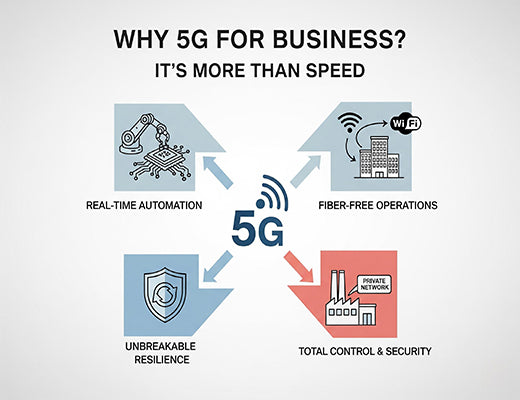
Why Do Enterprises Need to Adopt 5G? A Guide to the Business Revolution
|
|
Time to read 5 min
|
|
Time to read 5 min
5G's true value for enterprises lies in its two "superpowers": massive bandwidth and ultra-low latency, which solve critical business challenges.
Adopting 5G enables mission-critical use cases that were impossible with 4G or unreliable with Wi-Fi, such as real-time robotics control and high-performance business failover.
5G allows enterprises to "cut the cord," reducing reliance on slow-to-deploy and costly wired infrastructure for both primary and backup connectivity.
The bridge to harnessing these benefits is a professional-grade industrial 5G router, which provides the necessary performance, security, and reliability.
I've sat in boardrooms where executives ask, "Is 5G just faster Netflix on our phones, or is it something more for the business?" It's a fair question. For years, the promise of "digital transformation" has been constrained by the practical limits of our networks. Factory Wi-Fi has dead zones, and 4G, while reliable, has limitations on speed and responsiveness.
Let's be clear: 5G is the technology that breaks those constraints. For enterprises, it is something fundamentally more than just a speed boost. It’s a new set of tools that enables you to redesign your operations to be faster, smarter, and more resilient.
So, why do enterprises need to adopt 5G ? Because it provides a tangible competitive advantage. This guide will break down the four key business revolutions it enables.

To understand 5G's business impact, you need to look beyond the gigabit speed figures and focus on its two game-changing capabilities for industrial and enterprise use:
These two "superpowers" are the drivers behind the 5G business revolution.
The real 'aha!' moment for many operations managers is realizing what URLLC makes possible. In a smart factory, the unreliability and roaming failures of Wi-Fi often cripple the efficiency of Automated Guided Vehicles (AGVs). By equipping an AGV fleet with 5G routers, one facility
slashed connectivity-related downtime by over 99% and boosted material handling efficiency by 30% . The ultra-low latency allows for precise, real-time command and control that Wi-Fi simply cannot guarantee.
For decades, getting high-speed, reliable internet meant waiting for the cable or fiber company. With 5G FWA (Fixed Wireless Access), you can deploy a gigabit-speed connection in hours. This eMBB capability allows enterprises to:
A powerful 5G CPE with the latest Wi-Fi 6 technology is essential here, as it can handle the high density of connected devices found in a modern smart office or passenger Wi-Fi scenario.
What is the cost of an internet outage? For a financial institution, it can be millions. 5G provides a business continuity solution that is not just a backup, but a high-performance backup. When a primary fiber line fails, a 5G router can automatically take over in
under 30 seconds , providing enough bandwidth to run an entire branch office without compromise. This turns a catastrophic outage into a minor, background IT alert and has been shown to prevent millions in potential revenue loss annually.
This is the ultimate step for many large enterprises. Instead of relying on a public carrier network, a business can deploy its own
Private 5G network on its campus, in a factory, or at a port. This provides unparalleled control over security, performance, and reliability. It allows you to custom-tailor the network for your specific applications, using features like network slicing to guarantee bandwidth and low latency for your most critical machinery, like a fleet of autonomous robots.

So, why do enterprises need to adopt 5G ? The answer is simple: because your competitors will. 5G is not a far-off, futuristic technology. It's a practical and accessible platform that is solving real-world business problems right now.
Adopting 5G is a strategic decision to build a more efficient, intelligent, and resilient operation. The bridge to these benefits is a purpose-built industrial 5G router that provides the necessary performance, security, and reliability. By starting today, you can build a significant and lasting competitive advantage.

A1: Public 5G coverage is expanding rapidly but is not yet ubiquitous. However, all professional 5G routers are fully backward-compatible with 4G/LTE networks. This makes a 5G router a safe, future-proof investment, as it will use the best available network at any given location.
A2: The 5G standard itself has strong, built-in encryption. However, true enterprise-grade security comes from the device connecting to the network. Using an industrial 5G router with a hardened OS, a powerful stateful firewall, and the ability to create a secure VPN tunnel is essential for protecting your corporate data.
A3: No. A professional industrial 5G router acts as a bridge or gateway. It connects to your existing equipment (like PLCs, computers, and IP cameras) via standard interfaces like Ethernet, Wi-Fi, and serial ports, and then connects that entire local network to the new, high-speed 5G backbone.